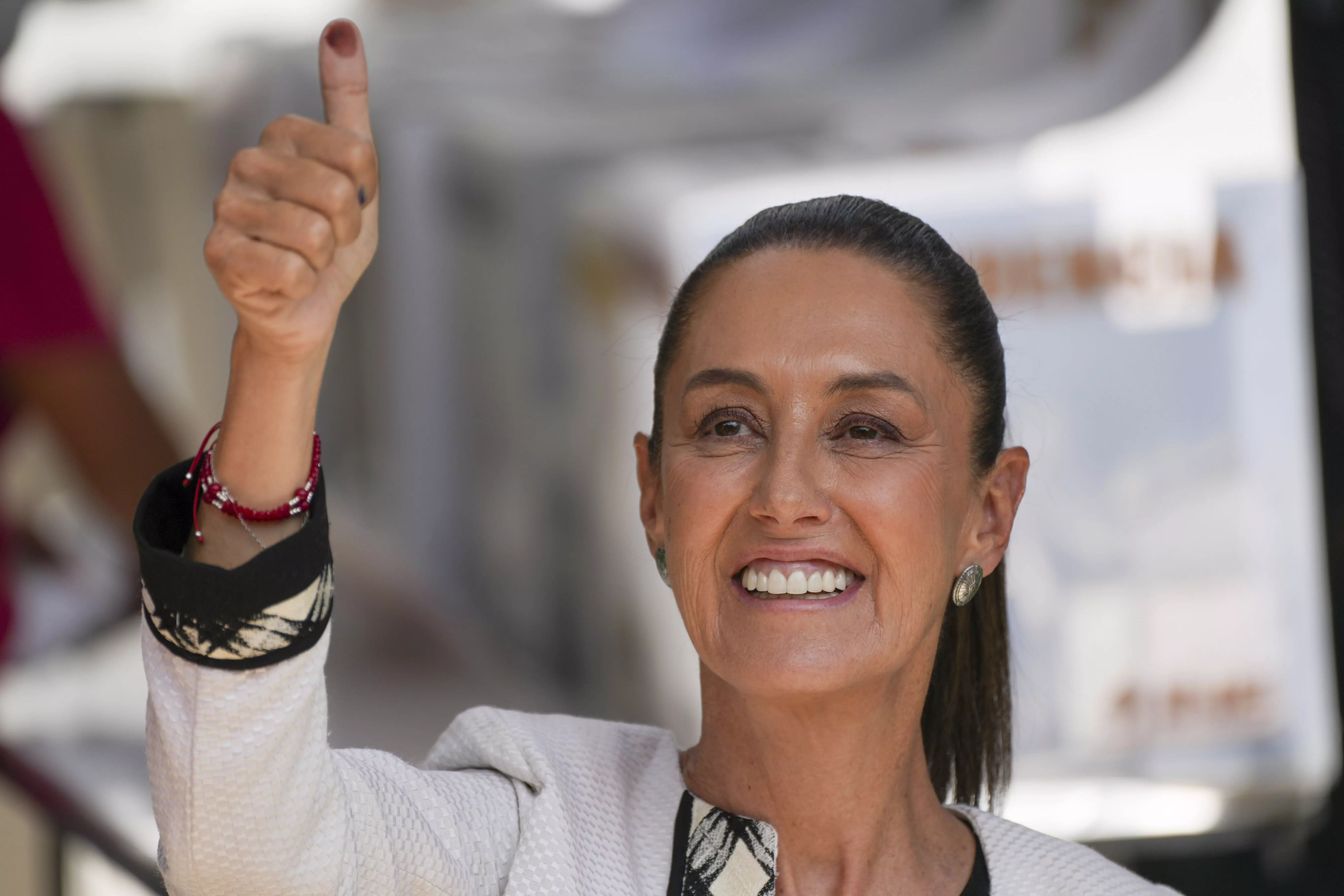Mexico Gets First Woman President

Ruling party presidential candidate Claudia Sheinbaum shows her ink-stained thumb after voting during general elections in Mexico City, Sunday, June 2, 2024. (AP Photo/Marco Ugarte)
MEXICO CITY: Claudia Sheinbaum claimed victory in Mexico’s presidential election, becoming the first woman selected for the job by promising to continue the political course set by her populist predecessor despite widespread discontent with persistent cartel violence and disappointing economic performance.
The climate scientist and former Mexico City mayor was the favored successor of outgoing President Andrés Manuel López Obrador. But her cool temper offers a sharp contrast in style — and a break with Mexico’s male-dominated political culture.
Sheinbaum said Sunday night that her two competitors had called her and conceded in an election that guaranteed Mexico would make history. The two leading candidates were women, and Sheinbaum is also be the first person from a Jewish background to lead the overwhelmingly Catholic country. Her main competitor, Xóchitl Gálvez, meanwhile, had a father who was Indigenous Otomi.
“I do not arrive alone. We all arrived, with our heroines who gave us our homeland, with our mothers, our daughters and our granddaughters,” Sheinbaum said with a smile, speaking at a downtown hotel shortly after electoral authorities announced an early count showed she held an irreversible lead.
The 61-year-old Sheinbaum led the campaign wire-to-wire despite a spirited challenge from Gálvez. But Sheinbaum is unlikely to enjoy the kind of unquestioning devotion that López Obrador has enjoyed.
Yoselin Ramírez, 29, said she voted for Sheinbaum, but split her vote for other posts because she didn’t want anyone holding a strong majority.
“I don’t want everything to be occupied by the same party, so there can be a little more equality,” she said without elaborating.
The main opposition candidate, Gálvez, who rose from selling snacks on the street in her poor hometown to start her own tech firms, tried to seize on Mexicans’ concerns about security and promised to take a more aggressive approach toward organized crime.
By Monday morning, with the 76.1% of the polling place tallies counted by Mexico’s electoral authority, Sheinbaum had 58.6% of the vote, followed by Gálvez with 28.3%. Longshot candidate Jorge Álvarez Máynez trailed with 10.5% of the vote. Sheinbaum’s Morena party was also projected to hold its majorities in both chambers of Congress.
If the margin holds, it would approach López Obrador's landslide victory in 2018. He won the presidency after two unsuccessful tries with 53.2% of the votes, in a three-way race where National Action took 22.3% and the Institutional Revolutionary Party took 16.5%.
The elections were widely seen as a referendum on López Obrador, who has expanded social programs but largely failed to reduce cartel violence in Mexico.
In Mexico City’s main plaza, the Zocalo, Sheinbaum’s lead did not draw the kind of cheering, jubilant crowds that greeted López Obrador’s victory in 2018. Those present were enthusiastic, but comparatively few in number.
In Mexico City’s main plaza, the Zocalo, Sheinbaum’s lead did not draw the kind of cheering, jubilant crowds that greeted López Obrador’s victory in 2018. Those present were enthusiastic, but comparatively few in number.
Sara Ríos, 76, a retired literature professor at Mexico’s National Autonomous University, celebrated after hearing that Gálvez had conceded.
“The only way that we move forward is by working together,” Ríos said. “She is going to work to bring peace to the country, and is going to manage to advance, but it is a slow process.”
Earlier, Fernando Fernández, a chef, 28, joined the relatively small crowd, hoping for a Sheinbaum victory, but even he acknowledged there were problems.
“You vote for Claudia out of conviction, for AMLO,” Fernández said, referring to López Obrador by his initials, as most Mexicans do.
But his highest hope is that Sheinbaum can “improve what AMLO couldn’t do, the price of gasoline, crime and drug trafficking, which he didn’t combat even though he had the power.”
Sheinbaum promised to continue all of López Obrador’s policies, including a universal pension for the elderly and a program that pays youths to apprentice.
Gálvez, who ran with a coalition of major opposition parties, left the Senate last year to focus her ire on López Obrador’s decision to avoid confronting the drug cartels through his “hugs not bullets” policy. She pledged to more aggressively go after criminals.
Julio García, a Mexico City office worker, said he was voting for the opposition in Mexico City’s central San Rafael neighborhood. “They’ve robbed me twice at gunpoint. You have to change direction, change leadership,” the 34-year-old said. “Continuing the same way, we’re going to become Venezuela.”
López Obrador claims to have reduced historically high homicide levels by 20% since he took office in December 2018. But that’s largely a claim based on a questionable reading of statistics. The real homicide rate appears to have declined by only about 4% in six years.
In Iztapalapa, Mexico City’s largest borough, Angelina Jiménez, a 76-year-old homemaker, said she came to vote “to end this inept government that says we’re doing well and (still) there are so many dead.”
She said the violence plaguing Mexico really worried her so she planned to vote for Gálvez and her promise to take on the cartels. López Obrador “says we’re better and it’s not true. We’re worse.”
( Source : AP )
Next Story

